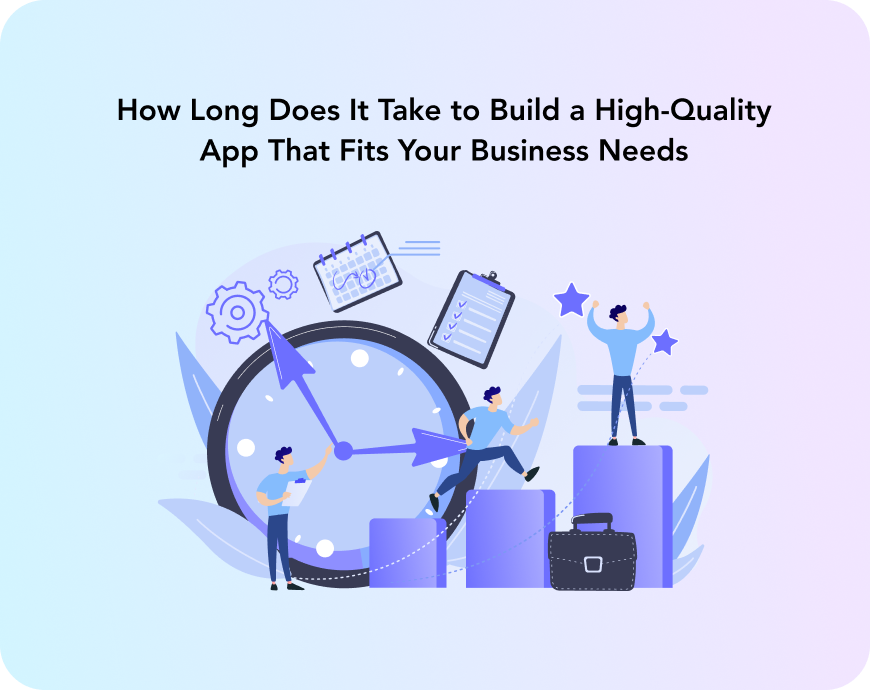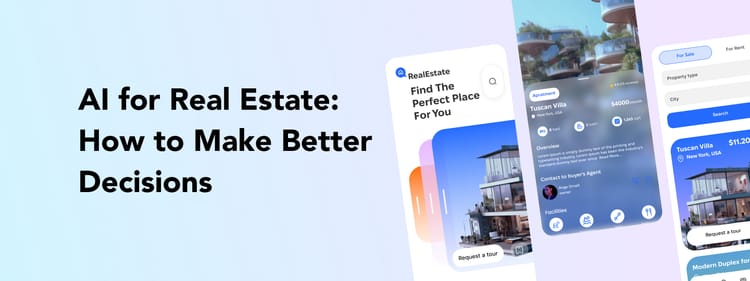If you are planning to build a mobile app for your business, there is no better time than now. Why? Just take a look at the graph below. Every year the download rates of apps are rising. Smartphone users are exploring the convenience and ever-growing possibilities of mobile technologies. This tendency is unlikely to change anytime soon, so now is high time to start working on your mobile app. Let’s discuss the question any potential mobile app development client asks: how long does it take to develop an application?
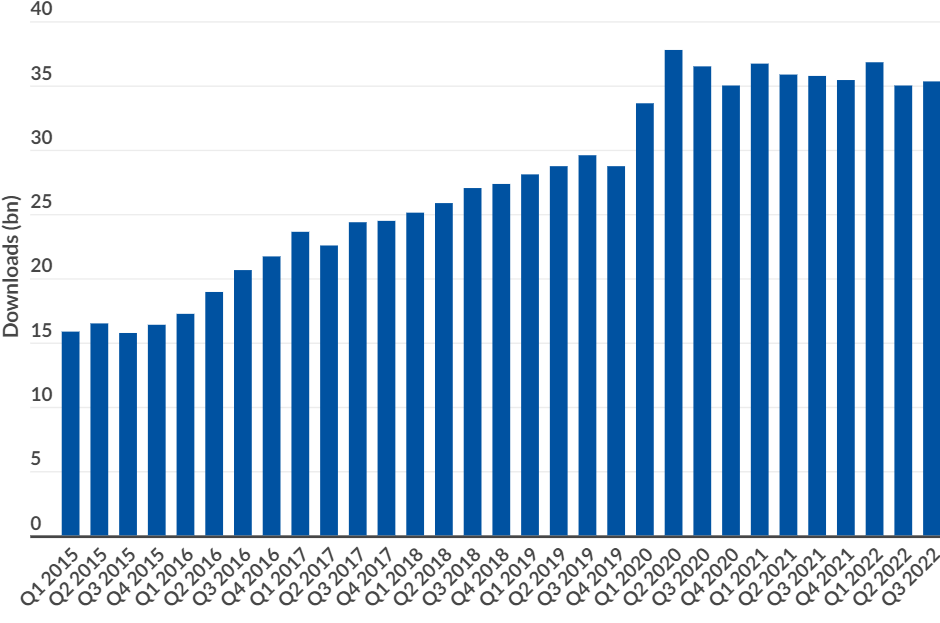
What Affects App Development Time?
To give you an estimation of how long does it take to develop an app, we first should explain what makes up the app development time. You might know that there are no two apps that take exactly the same time frame to get built. From the business domain to tech solution choices, there are many parameters forming the app development time.
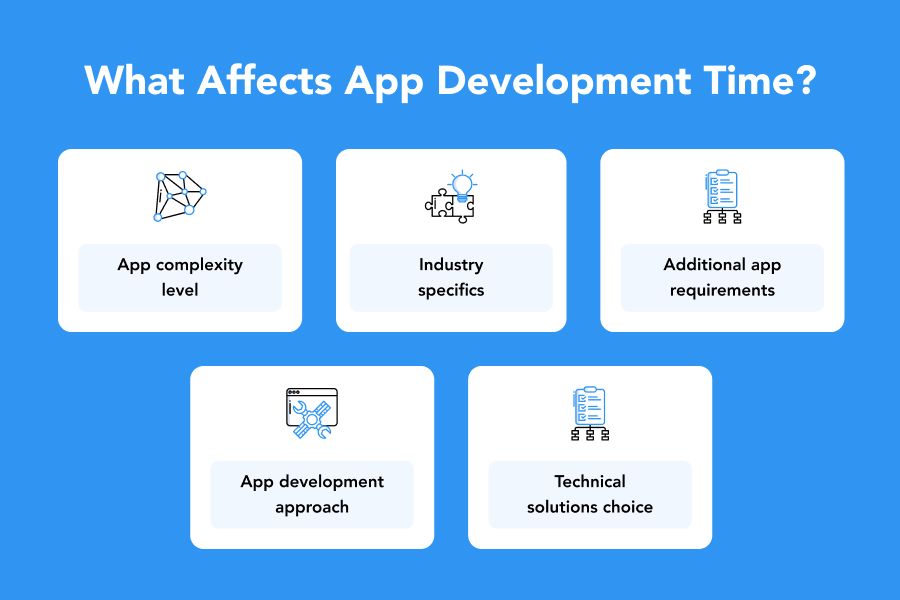
App complexity level
Let’s start with the most evident criterion influencing the average app development time. Any app screen, button, integrated API, or illustration takes time to get created. Clearly, building an app with 5 screens takes twice less time as an app with 10 screens. An MVP (minimum viable product) with a basic feature set and minimum updates to standard components will take less time to complete than a complex app with a fully custom design and, let’s say, a video player integration.
Industry specifics
Each industry requires a certain set of features. For example, e-commerce applications need payment integrations while maps API is a must for a food delivery solution. For some industries, the list of necessary functionality might be longer, and for some shorter. Additionally, some domains, like banking, might require extra data safety measures.
Additional app requirements
Speaking of additional requirements, let’s remember about legal guidelines some of the apps have to follow. For example, any medical app that collects patient data needs to comply with HIPAA as well as integrate electronic health records. Overall, user data is a critical aspect of any app type and the development team needs to pay close attention to what kind of information is shared and the rules around that data type in certain domains and countries. Of course, this means extra development time.
App development approach
One more factor shaping what does it take to develop an app is the development approach you choose. Your options are
- Developing an application yourself (given you have proper tech background)
- Use of app builder (no-code platforms)
- Hiring an in-house team
- Collaborating with a freelancer
- Outsourcing a full-cycle app development company
Each of these ways has its pros and cons. For example, an in-house team is usually more expensive than outsourcing and requires more management from your side. That’s why, in most cases, outsourcing an app development company is more cost-effective and reliable given that you choose your tech partner wisely.
Technical solutions choice
Finally, any technical decision leads to changes in the timeline for app development. Different programming languages and frameworks might take a shorter or longer time to complete the project. The major decision here is choosing between native and hybrid apps (in case you need both iOS and Android apps). The cross-platform approach allows sharing the code across two platforms, cutting the development time in half. Of course, it has certain limitations, so the choice should be made based on your project requirements.
If you need the team to work on the wearable devices app development too, expect extra time spent adapting the mobile app to a new format.
What Does It Take to Develop an App?
Now that we understand which factors can change the mobile app development timeline let’s look into the process in detail. We will list how many hours does it take to develop an app from pre-planning to deployment.
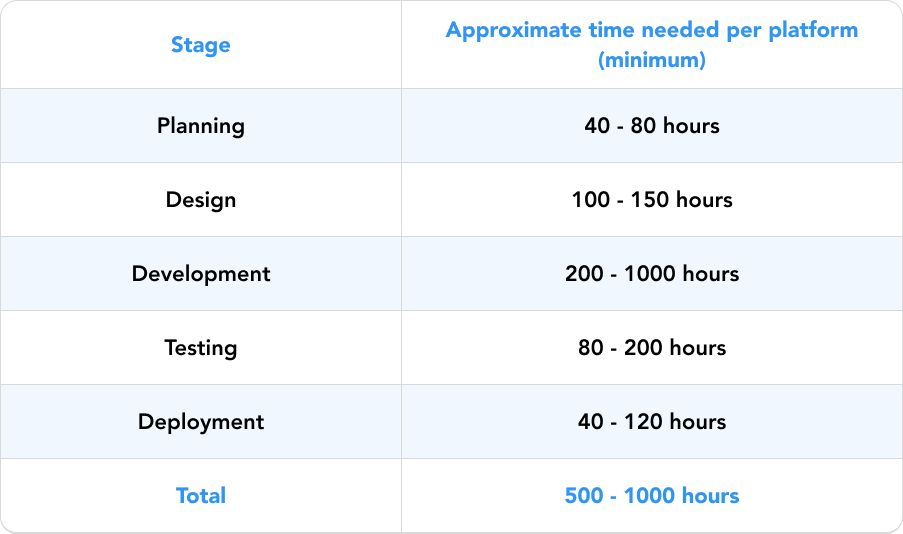
Planning
It is impossible to organize work and stick to deadlines without planning. A mobile app development company will usually analyze your tech&design requirements, domain specifics, and so on to create a proposal outlining all the milestones, deliverables, and deadlines. Such a roadmap will help the team organize the work effectively and let you understand when to expect certain results.
UI/UX design
For any mobile app development project to succeed, the next step has to be research. All the app architecture, visual, and tech decisions have to be research-based in order to solve users' requests and bring them value. It is impossible to predict potential users’ problems and offer smart solutions without engaging in a proper study first. Plus, it's useful to know how to validate app ideas to be sure that your app will be in demand.
Usually, to understand what potential users are looking for in your domain's app and which similar solutions already exist, business development and design teams conduct
- Competitor research, pointing out the advantages (best practices) and disadvantages (what is missing that can be presented in your app)
- User persona research (creating a hypothetical user, describing their pains, needs, and lifestyle to suggest the best app addressing their problem)
Based on these findings, the feature set of an app is selected and the journey map is created. Later on, designers are making the first low-fidelity prototypes called wireframes. These are for defining the app’s screens, outlining the elements, and laying out the navigation. Wireframes are easy to modify and play around with, so it’s high time for you to make change requests and rearrangements. If you liked everything, the team can move on to more detailed prototypes, working on the colors, examples of microinteractions, fonts, buttons, illustrations, and other visual elements.
Development
The next step is to bring the mobile app design to life. Depending on the platform of your choice and the app development approach, the average time to develop an app will vary.
If you only need an app for one platform (either iOS or Android), there are not many choices to be made. You only might discuss particular frameworks or APIs with your app development team.
In case you are looking for both iOS and Android applications, consider cross-platform app development, for example, you can get Flutter app design services. In this way, one application can run on both platforms, cutting the development time in half.
Testing
Testing is an irreplaceable step for any mobile app development project. Don’t let companies or freelance developers convince you otherwise. Skipping the QA stage won’t save your budget but only lead to losing money. How? By having high abandonment rates due to users noticing bugs, getting negative reviews, trying to save your reputation, and fixing the issues later on. Sounds reasonable enough to dedicate a few hours to test the app before the release, doesn’t it?
Deployment
Finally, your mobile app is ready for release. The only thing left is to upload it to the platforms where users can download them, such as Apple App Store and Google Play Market. Usually, the team you are working with will assist you with obtaining the necessary certificates and permissions as well as uploading the app to the markets.
What Slows Down the App Development Process?
There might be some bottlenecks influencing how long does it take to make an application and slowing down the process. Let’s discuss which pitfalls to avoid if you want to receive your mobile product without extensive (or extended) deadlines.
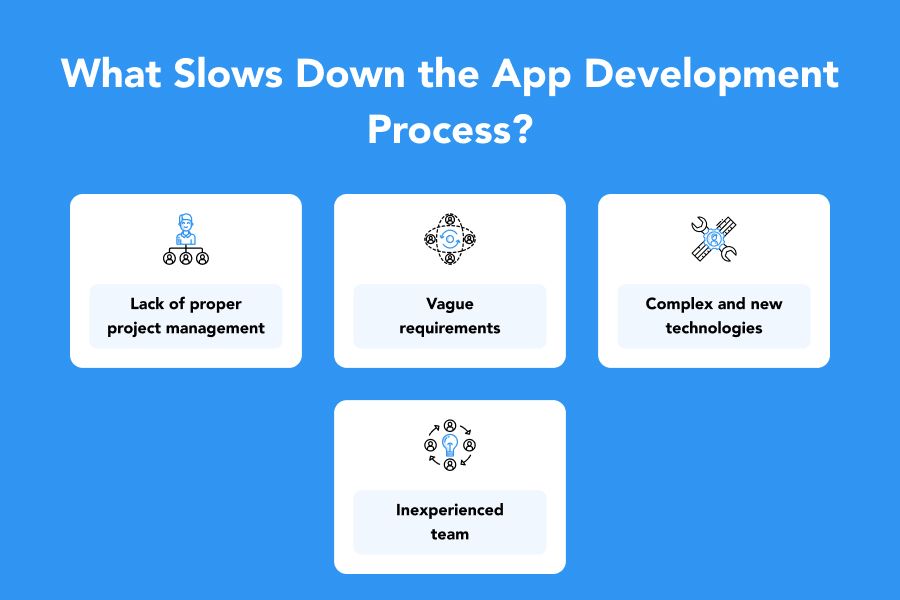
Lack of proper project management
One of the main factors that shape how long does it take to make an app is the project management and communication inside of a team. A project manager is responsible for collecting requirements, setting realistic deadlines, checking the work progress, and ensuring smooth communication between team members and a client. With any of these points missing, there are extended deadlines appearing. That’s why project management matters so much for the project’s length and success.
Vague requirements
Each team member, be it a UI/UX designer or mobile app developer, needs to know exactly what to do. Now, we are not talking about you telling what color a button should be or which map API works better. No, your task here is to give clarity about your expectations as to the app’s appearance, performance, and goals.
When hopping on a call with a design team, they might ask about the apps that appeal to you for a reference or show you some styles to choose between. A development team can ask how many users you are expecting to have, so they can make appropriate tech stack decisions.
Complex and new technologies
The next parameter that defines how long does it take to create an app and can possibly slow down the process is how complex of a tech stack your solution requires. If you are planning to rely on, let’s say, an AR framework just released a few months ago, a development team might need some extra hours getting adjusted to it. The same goes for any complex technology, like image recognition or AI: all of those add several more hours to the process.
Inexperienced team
When it comes to the question of how long does it take to build an app and its quality, a team that doesn’t have enough experience in mobile app development, can significantly disrupt the process. While for junior designers and developers it overall takes more hours to complete certain tasks, the lack of experience in certain industries also slows down the process.
How to Speed Up The Time of Application Development?
So how does one not only avoid the issues that are slowing down the development process but also speed it up and receive a ready-to-go solution in the shortest terms?
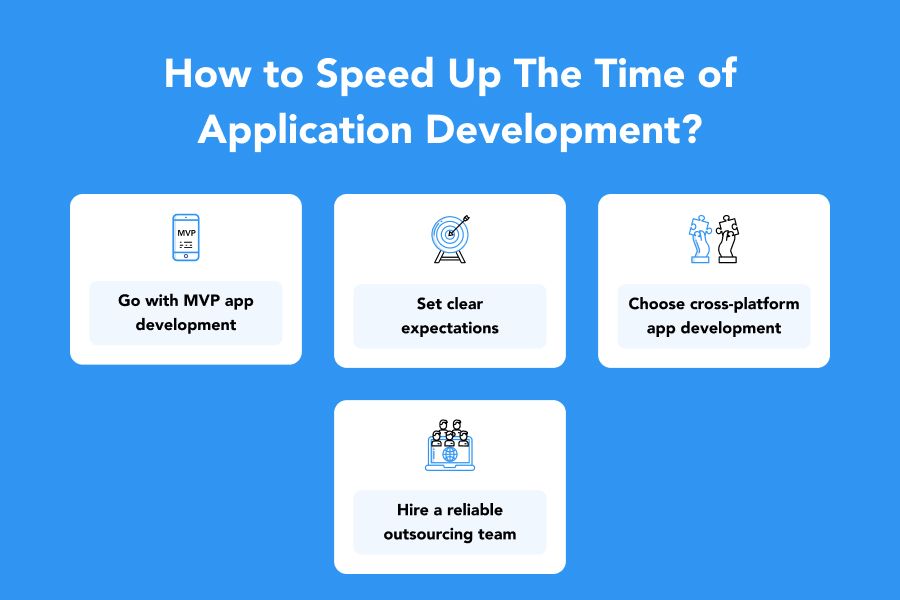
Go with MVP app development
MVP app development approach is our frequent suggestion for startups and small-scale companies. This method allows cutting the development time significantly by choosing only the most necessary features to implement.
Set clear expectations
As we have mentioned above, the app development process is likely to be faster if every team member has a precise task and doesn’t need to spend time clarifying the instructions. That’s why your job is to communicate your vision and expectations effectively, while the project manager needs to organize the team and set realistic goals.
Choose cross-platform app development
In case you need both iOS and Android apps, consider going with cross-platform app development to cut the process timeframe in half. When it comes to simpler, MVP-suitable apps, a cross-platform app is impossible to tell apart from a native one. As a bonus, you are also saving your budget because you only need to get one app developed instead of two.
Hire a reliable outsourcing team
Finally, a reliable and experienced team is key to speeding up the development process. While a junior-level team that doesn’t have experience in your industry needs additional time to work things out, a more professional company knows your domain’s main requirements, understands which features are needed, and can work with the tech stack more efficiently.
Consider Perpetio Your Trusted Partner
At Perpetio we have been creating apps both for established companies and entrepreneurs starting their businesses from scratch. Sometimes we have to build a travel app in under 2 months or dedicate 8 months to making iOS and Android versions of a Burn workout app along with creating branding and a website too. In both cases, our main task is to deliver a high-quality mobile product on time. Such an outcome is only achieved thanks to our skilled design&development team and well-established process management.

Final Thoughts
The timeframe needed to build a mobile app from A to Z depends on a number of factors, starting from technical requirements and design complexity, and finishing with the team’s project management and seniority level. To make sure that you will receive your app when expected, choose a trustworthy development team and communicate your wishes in the early stages of collaboration.
Perpetio is open to new mobile app development projects.
FAQ
How long does it take to build an app prototype?
When it comes to the app prototype or MVP version, the average time needed is 500-1000 hours.
How long does it take to develop a business app?
On average, it takes around 500-1000 hours to build a simple mobile app.
How long does it take to make an app by yourself?
To make an app by yourself, you can hire a freelancer, work with an in-house development team, or outsource a company. In most cases, the average time needed is between 500-1000 hours for a simple app.
How long does it take to build a minimum viable product (MVP)?
When it comes to MVP app development, the minimum time needed is around 500-600 hours.
